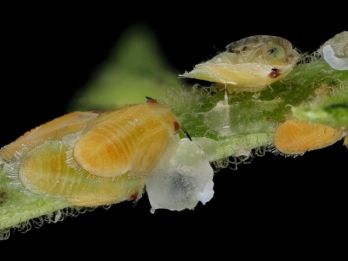Asiatic and African citrus psyllids
The Asiatic citrus psyllid (Diaphorina citri) and African citrus psyllid (Trioza erytreae) are sap-sucking pests that are also vectors for a serious plant disease.
Background
The psyllids damage citrus plants by feeding on them, but they pose a greater threat through the ability to spread Huanglongbing (yellow dragon disease).
Neither of the psyllids nor disease are present in Australia – the Asiatic citrus psyllid was previously detected and eradicated.
All commercially grown citrus plants are hosts for these pests, including some native species and relatives that are common in naturalised vegetation, home gardens, and parks. Murraya varieties, such as ornamental mock orange, orange jasmine and curry trees (Bergera koenigii), can also attract psyllids.
Impacts
The insects spread over long distances via infested plant material and tropical storms. They would present a major economic threat to citrus growers if established in South Australia.
African citrus psyllid nymphs cause cup-shaped or pit-like galls as they feed on immature leaves, particularly on the lower surface. These are visible as bumps in the upper surface, resulting in severe leaf distortion, curling, stunting, and yellowing.
Management
Management
Growers can use on-farm biosecurity measures to reduce the chance of pests and disease getting onto their properties. These include:
- using pest-free propagation material and seedlings, sourced from a reputable supplier
- putting up farm biosecurity signs on gates and fences to manage visitors
- avoiding sharing equipment
- keeping equipment and vehicles clean and free of plant matter
- wearing clean clothing before visiting other growers’ properties
- teaching farm workers on-farm hygiene practices, what to look for and how to report unusual pests and diseases
- report suspect symptoms to the Exotic Plant Pest Hotline.
Identification
Adults are 3 to 4 mm long and brownish in colour. The forewings are patterned with mottled brown patches and the abdomen has a pointed shape when viewed from above.
Adult males are smaller than females. Psyllids have a recognisable feeding posture, with the head down, almost touching the plant surface, and the body lifted at 45-degree angle. They can be confused with aphids, but psyllids are more active and jump at the slightest disturbance.
Nymphs are a dull orange colour with red eyes. They are small and flat, making them difficult to see on the surface of twigs, leaves, buds, and stems of flushing growth less than 50mm long. They are similar to soft scale insects, such as soft brown scale (Coccus hesperidum), a common pest of citrus throughout Australia. On close examination, psyllid nymphs have clear body parts compared with scale.
The nymphs secrete white, string-like honeydew that can melt to form droplets at temperatures above 36ºC. The ground or vegetation under a badly infested tree can look like it has been dusted with white powder.
Eggs are bright yellow-orange and almond-shaped. They are laid in groups on buds and young flush tips less than 10mm long.
Lifecycle
The total life span of Asiatic psyllids can be 15 to 47 days, with some adults living for several months. Females lay more than 800 eggs during their lives and there can be 9 or 10 generations a year.
Adult African psyllids live for 17 to 50 days. Females can lay from 217 to 1,305 eggs, which hatch within 6 to 15 days. The nymph stages last between 17 to 43 days.


